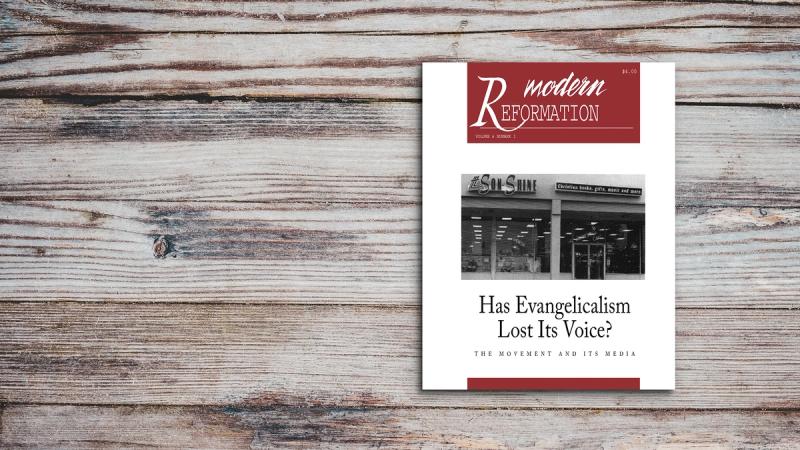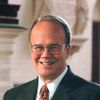MR: Why did you launch Christianity Today?
CH: The magazine had several sponsors-notably Billy Graham and his father-in-law, Dr. L. Nelson Bell, who were disturbed by the liberal drift of mainline Presbyterianism. There were generous evangelical board members concerned over modernist ecumenism, and a dedicated editorial staff of which I was editor-in-chief. Christianity Today was launched, negatively, because the Christian Century distorted the American religious scene in terms of the theological and political and economic left and, positively, because of the dire need for a cognitively oriented journal devoted to biblical theology, ethics and apologetics, and predicated unapologetically on the authority and inerrancy of the Scriptures.
MR: It wasn’t conceived as a popular magazine designed for the laity, was it?
CH: Its originally intended audience was “thinking Christians”-the clergy, teachers, church leaders, seminarians, collegians, that is, “lay intellectuals” generally. It soon garnered the largest circulation to the clergy of any magazine. Time remarked that its content and readership gave evidence of the existence of an international, interdenominational scholarship supportive of the evangelical outlook.
MR: At its peak as a thought journal what was the magazine’s paid circulation and what is its current circulation?
CH: About 170,000 paid subscribers, then and now.
MR: Our random sampling of early issues identified many thoughtful essays designed to guide theological reflection, submitted by representatives of confessional Reformed and Lutheran as well as evangelical and Baptist traditions. Themes like justification, sanctification, and even predestination found a place alongside contemporary issues and debates. What has happened?
CH: I don’t intend to bad-mouth Christianity Today. Its editors and supporting board determine what is important to them. It needs to be read for a window on contemporary Evangelicalism. Many evangelicals find it theologically disappointing and cognitively ambiguous. Its news section remains among the best, although more proficient in covering evangelical failure than evangelical success.
MR: Is the magazine a microcosm of the larger evangelical movement today?
CH: Unfortunately, yes. The leading evangelical colleges and magazines ought to be the intellectual pacesetters. Instead, some seek to network with the spirit of the age. Postliberalism is welcomed by some campus theologians, neoorthodoxy is promoted by some editors-admittedly by scholars who seem unaware of concessions they make, and who perhaps think they are serving historic Christianity well. The double tragedy is that evangelical funding unwittingly supports such compromises of the biblical heritage.
MR: There are calls today (including a recent Christianity Today editorial) for an Evangelicalism that has “a center without a boundary.” Some of us are calling ourselves “confessing evangelicals” in order to affirm our unity with those outside our own tradition to identify with the “solas” of the Reformation. What do you make of all this?
CH: Even the “people of God” seem sometimes to turn the vocabulary of belief into monstrous confusion. One need only compare and contrast the recent emergence of “confessing evangelicals” and the publication by InterVarsity of The Nature of Confession edited by two Wheaton College professors. Some contributors in this book eagerly reject biblical inerrancy, propositional revelation, and an adequate exposition of the nature and strength of the biblical heritage. The problem is not only that secular society today readily misunderstands “confessing evangelicals” as somehow holding a police record, but that more and more professing evangelicals also know so little about church history that they are prone to think the Reformation is a penal probation. One wonders sometimes if it will take waves of Muslim-like persecution to sift evangelical revivals and intentions. Evangelical unity cannot be forced by promotional techniques, nor can it be hurried. It will likely come when evangelicals see through tears that their disunity has not only penalized their common cause, but even more it has pierced the crucified and risen and returning Lord. And that eventuation is unlikely to come apart from theological awakening that calls God’s people to prayer and adoration alongside a well-worn Bible.
MR: What encouragements and warnings can you give us as we seek to defend evangelical truth?
CH: The risen Lord told his hard-pressed disciples “You must not leave Jerusalem” on their earth-encompassing mission without the Holy Spirit’s empowerment. Pentecost was once-for-all, but its realities and implications remain. God has written prayer into the universe as one of the means through which His sovereign will is achieved. Spirit-sanctified believers are essential to both a comprehensive defense of evangelical truth and a constructive engagement of the wider culture. The risen Lord’s presence amid two or three godly and courageous disciples can still be the center of history’s enduring action. The prayer meeting where Scripture is read and trusted holds dutiful priority along with defense of the truth and engagement of the culture.
The Church has as its mission the winning of lost humans. A congregation that is so busy defending truth and engaging culture that it neglects its evangelistic imperative needs to rethink its priorities.
Mediating evangelicals seem now routinely to forfeit the inerrancy of the Bible and seek to compensate for such devaluation by insisting aggressively on biblical authority. But one cannot really have it both ways.






